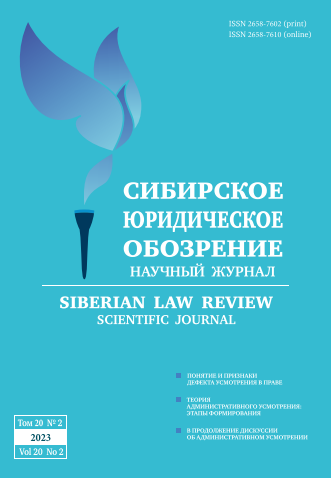Features of Tactics of Interrogation of Juvenile Witnesses and Victims
- Authors: Rodina E.Y.1
-
Affiliations:
- Saint Petersburg University of the Ministry of the Interior of Russia
- Issue: Vol 20, No 2 (2023)
- Pages: 203-213
- Section: CRIMINAL LEGAL SCIENCES
- Published: 07.07.2023
- URL: https://journal-vniispk.ru/2658-7602/article/view/349086
- DOI: https://doi.org/10.19073/2658-7602-2023-20-2-203-213
- EDN: https://elibrary.ru/WATEWN
- ID: 349086
Cite item
Full Text
Abstract
In the article, the Author analyzes the organizational, legal and tactical features of the interrogation of juvenile victims and witnesses. Currently, there are problems of observing the rights of juvenile participants in criminal proceedings included in the mechanism of the crime, and the specifics of their personal and psychophysiological characteristics make this investigative action particularly difficult and time-consuming. In this connection, the Author has set the purpose of this article to study the organizational and legal possibilities of questioning juvenile victims and witnesses. In the course of studying law enforcement practice and the most common mistakes made during interrogations of minors, the main stages of this investigative action are highlighted and the most effective recommendations for their conduct are proposed, taking into account the psychophysiological characteristics of minors. The methodology of this research consists of: dialectical, analytical, comparative legal, empirical methods of cognition, comparative and logical-structural analyses, a systematic approach and a method of analysis and generalization of practice. The conducted research and the practical experience of the Author allowed us to draw conclusions about the imperfection of law enforcement practice and legal regulation of the interrogation of a minor. According to the Author, amendments to the current legislation will make it possible to fully use all possible tactics of interrogation of minors, which will increase the effectiveness of interrogation and minimize the possibility of repeated psychotraumatization of minors. The findings of the study can be used by practitioners when conducting investigative actions with the participation of minor victims and witnesses during the investigation and disclosure of crimes of various types. The theoretical conclusions made in the course of the study will help in studying the tactics of interrogation in the discipline “Criminalistics”.
About the authors
Elena Yu. Rodina
Saint Petersburg University of the Ministry of the Interior of Russia
Author for correspondence.
Email: elena_rodina1981@mail.ru
ORCID iD: 0000-0002-6147-6462
SPIN-code: 9153-0617
Senior Lecturer of the Department of Criminology
Russian Federation, 1 Pilyutova st., St. Petersburg, 198206References
- Zakharova N. M., Milekhina A. V. The Basic Principles of Providing Medical and Psychological Care to Victims of Violence. Russian Journal of Psychiatry. 2017;6:32-39. (In Russ.).
- Rossinskii S. B. Investigative Actions. Moscow: Norma Publ.; 2018. 238 p. (In Russ.).
- Porubov N. I. Interrogation in the Soviet Criminal Process and Criminalistics. Minsk: Vysheishaya shkola Publ.; 1968. 274 p. (In Russ.).
- Galimov O. Kh. Minors in Criminal Proceedings. St. Petersburg: Piter Publ.; 2001. 223 p. (In Russ.).
- Belkin R. S. Collection, Research and Evaluation of Evidence. Moscow: Nauka Publ.; 1966. 295 p. (In Russ.).
- Vaske E. V., Soboleva K. Yu. Psychological Aspects of Training Future Employees of Investigative Authorities To Work with Underage Victims. Vestnik of Lobachevsky University of Nizhni Novgorod. 2017;4:94-97. (In Russ.).
- Kiryanina I. A., Mishenina A. A. Topical Issues of Interrogation Tactics Minors Involved in Criminal Proceedings. The Rule-of-Law State: Theory and Practice. 2014;4:133-136. (In Russ.).
Supplementary files












